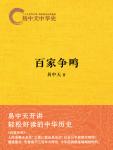Chapter 1 Chapter 1 Can the World Be Saved?
Zhuangzi, dressed as a swordsman, strode up to the king.
Zhao Wang waited with his sword.
Wang asked: Sir, what do you plan to use to teach the widows when you ask for an audience?
Zhuangzi said: the sword.
Wang asked: How about the master's sword?
Zhuangzi said: The sword of a minister, one person at ten steps, does not stay behind for a thousand miles.
Wang said: "The world is invincible!"
Zhuangzi said: You might as well give it a try.
Wang asked: I don't know if you use a long sword or a short sword?
Zhuangzi said: It doesn't matter whether it is long or short.But there are three swords, which one does the king want?
Wang said: May I ask which three swords?
Zhuangzi said: the sword of the Son of Heaven, the sword of princes, and the sword of common people.
The king asked: How about the sword of the Son of Heaven?
Zhuangzi said: Yan State is the front, Qi State is the blade, Wei State is the ridge, Song State is the ring, South Korea is the handle, Bohai Sea is the sheath, and Beiyue is the belt. hinder.As soon as the sword comes out, the princes will be upright, and the world will be settled.This is the sword of the Son of Heaven.
Zhao Wang was at a loss.
Ask again: How about the sword of the princes?
Zhuangzi said: Wisdom and courage are the front, integrity is the blade, virtuousness is the spine, loyalty and sages are the ring, and heroes are the handle.Once this sword is released, it is like the fury of thunder, and everyone in the four seas obeys orders.This is the sword of princes.
Zhao Wang asked again: "How about the common people's sword?"
Zhuangzi said: Unkempt, unkempt, furious, jaw-dropping, filled with righteous indignation, the head is taken from the top, and the liver is taken from the abdomen. It is called using a sword, but it is actually a cockfight.This kind of common people's sword can be found everywhere in the king's subordinates, right?
After hearing this, King Zhao took Zhuangzi's hand and invited him to the hall, but he walked around the dining table, unable to calm down for a long time.
Zhuangzi said: Your Majesty, sit still and calm down, the minister of swordsman has finished playing.
Of course, this is not a historical fact, not even what Zhuangzi himself said, but a fable compiled by the descendants of Zhuangzi's school of thought.If it is a fable, it has a meaning; and the meaning can be expressed separately.
In other words, the "Speaking of Swords" in the book may as well be regarded as a symbol of the contention of a hundred schools of thought in the pre-Qin period.
What are the pre-Qin philosophers?
The pre-Qin scholars are the greatest thinkers of our nation in the three hundred years from the late Spring and Autumn Period to the Qin and Han Dynasties.Because they were later divided into ten schools of Confucianism, Mohism, Taoism, Fa, Ming, Za, Nong, Yin and Yang, Zongheng, and novels, they were also called Jiuliu Ten Schools and Zhuzi Hundred Schools.
Among the various schools, the most influential ones are Confucianism, Mohism, Taoism, and Legalism.The most famous representatives are Confucius, Mozi, Laozi, Mencius, Zhuangzi, Xunzi and Han Fei.Their names are well-known in Chinese communities all over the world.In fact, although their time is far away, their influence is even more far-reaching, so far-reaching that its imprint can still be seen everywhere today.
It is a miracle that so many great thinkers came together, and this miracle is global.In fact, at the same time and at the same latitude (about 30 degrees north latitude), there were Sakyamuni in South Asia, Jewish prophets in West Asia, and ancient Greek philosophers in Southern Europe.No wonder the German philosopher Jaspers called this period the "Axial Age".
Yes, the Axial Age is also called the pivot stage.
The thinkers of the Axial Age were the spiritual leaders of the Jewish, Indian, Greek and Chinese nations, as well as the spiritual mentors of all nations in the world.The ideological principles they put forward not only shaped different cultural traditions, but also influenced human life all the time.Therefore, they are far away, but not unfamiliar.But at the same time, they are gracious, but not clear.How many people can tell their thoughts, viewpoints and methods in detail?I'm afraid not many.
Of course not, it must be sorted out.
Generally speaking, the four hundred years of the Axial Age can be divided into three stages.In the first stage, Confucius, the Jewish prophets, Sakyamuni, and Pythagoras were simultaneously saluted by the four major civilizations.In the second stage, Mozi was at the same time as Socrates, the author of "Laozi" was at the same time as Plato, Mencius and Zhuangzi were at the same time as Aristotle, and China and Greece advanced side by side.In the third stage, the Greeks also withdrew from the stage of history, leaving only our Xunzi and Han Fei.
This is another great spectacle.
The appearance of the spectacle is due to Confucius.Yes, the Jewish prophets and Sakyamuni had no rivals, and the ancient Greek philosophers were mentors and disciples.Only Confucius has both successors and challengers.Of course there are differences among the challengers, but the anti-holes are unanimous.The "Three Musketeers" Mozi, Zhuangzi and Han Fei pointed their swords at Confucius.The contention of a hundred schools of thought started from this, and it continued.
So what happened to Confucius?
Does he also have the Sword of the Son of Heaven?
Notes:
Notes:

